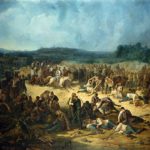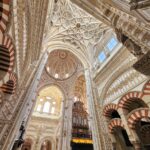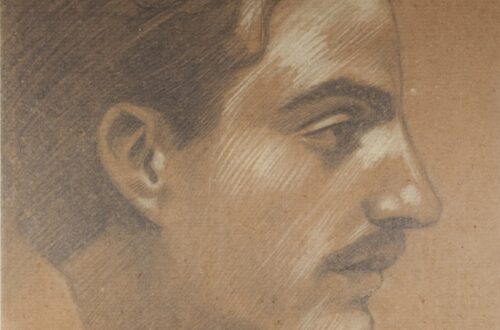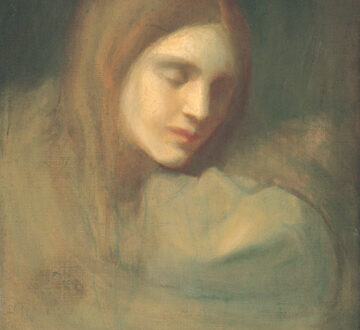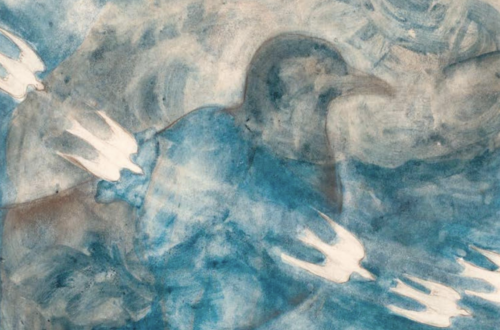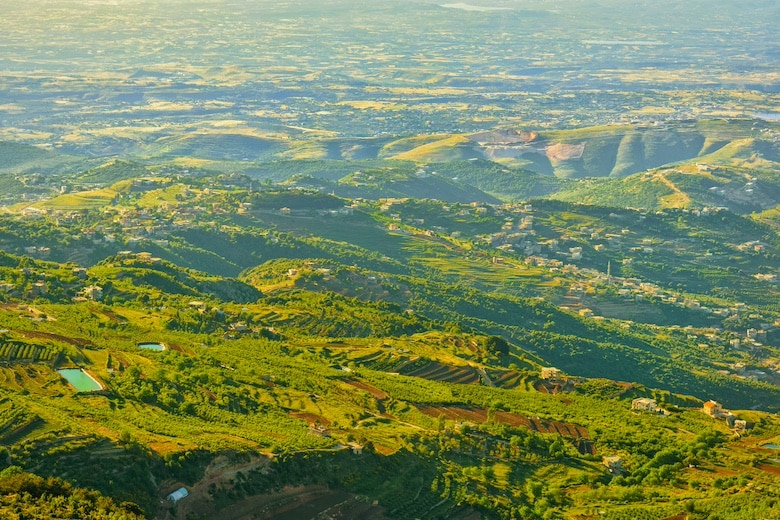
May Zaideh’s poignant country lost and found
Of the many cruelties of colonialism, one of the worst was the dissection of colonial possessions as colonialism came to an end. That dissection left lasting wounds which are yet to heal in many parts of the world and the lines drawn on maps in the interests of in faraway capitals still plagues the destiny of millions. May Ziadeh’s life was marked by that kind of history; that kind of geography. This article is dedicated to her poem “Where is My Country?” (عين وطني) published in her collection Shadows and Light (ظلمات وأشعة). The poem is presented below in its original Arabic, with my English translation.
May Ziadeh was born in Nazareth in 1886, at a time when the city was part of the Ottoman Empire. Then, the Empire still stretched around the shores of the Mediterranean from Bosnia to Tripoli (although Egypt was under British occupation). Ziadeh’s mother was born in what is today Syria and her father in what is, today, Lebanon. May completed her high school studies there and, after her family moved to Egypt in 1908, she went on higher education at Cairo University. This part of the world has of course been the scene of tragic and brutal conflicts and violence that continues today, not least in Gaza.
While the colonial context was part of May Ziadeh’s reality, as we shall see, her thoughts are deeper than that, and there are many reasons why she laments that she (unlike any other) is “she without a country.”
Also, while longing for a country, it is clear that she also felt connected beyond any national boundaries and her poem explores the contradictions she experienced. In a document she called her last will and testament she wrote:
“I love you Egypt.
I love you the East.
My soul is yours.
I love the West as well.
I love humanity in its true meaning.
I have compassion for its mistakes and pain and I believe in God.“*
Her life story is as intriguing as her poetry is evocative. At the height of her career, for around two decades, she established and led a literary salon that became a centre, school almost, for many of the great names in Egyptian literature. She was an early feminist writer and journalist. Later, her life was overcome by tragedy. Her poem follows.
Where is my country?
أين وطني؟
When the names of the countries were made known
I wrote down the name of my country and pressing it to my lips, kissed it.
And I felt pain and pride, for now, I too had a country, a home.
But then, there arose many questions, and details and problems for which there were no solutions.
عندما ذاعت أسماء الوطنيات.
كتبت اسم وطني ووضعت عليه شفتيَّ أقبِّلهُ.
وأحصيت آلامه مفاخرة بأن لي كذوي الأوطان وطنًا.
ثم جاء دور الشرح والتفصيل فألممت بالمشاكل التي لا تحل.
And I bowed my head in thought.
And as those thoughts lingered in me, my feelings altered.
For I felt a crushing humiliation.
Because I, unlike any other, was she without a country.
وحنيت جبهتي وأنشأت أفكر.
وما لبث أن انقلب التفكير فيَّ شعورًا.
فشعرت بانسحاق عميق يُذلُّني.
لأني، دون سواي، تلك التي لا وطن لها.
In the morning, the bugle call of occupying armies awakens me. The brazen blast of their trumpets is a troubling melody evoking tears of alienation; it is a paean of courage crushed, of loathing triumphant, which in an instant bends unity and determination towards forgetfulness of a heritage and resilience, bends it towards an overpowering humiliation.
يوقظني في الصباح نفير الجيوش المودعة. ولدوي أبواق النحاس أنغام تثقلها دموع الفراق، وأهازيج يُجنحها طلب التفادي والاستبسال، فأمقت الظافرين، وأودُّ لحظة أن أتوحد وإياهم لأنسى في ثروتهم فقري، وفي بطشهم هواني.
And when the parade of the oppressed nations passes by, flags lowered behind the coffins of their dead, their cries for freedom and independence overpowered by laments of loss and torment, I take pride that I am a daughter of a newborn people, not of a people whose glory is past and whose only destiny is decline.
وإذ تمرُّ مواكب الأمم المظلومة منكِّسة أعلامها وراء نعوش الشهداء، وهتاف الحرية والاستقلال يتغلب على أنين الثكل والتفجع منها، أعتز لأني ابنة شعب في حالة التكون والارتفاع، لا تابعة شعب تكوَّن وارتفع ولم يبق أمامه سوى الانحدار.
And yet, that same newborn people whispers fiercely in my ears, and they say: “You are not one of us because you are of another faith.” And they whisper: “You are not one of us because you are of another race.”
ولكن الشعوب تهمس همسًا يطرق مسمعي، فهؤلاء يقولون: «أنتِ لستِ منَّا لأنك من طائفة أخرى.» ويقول أولئك: «أنتِ لستِ منا لأنك من جنس آخر.»
So why, am I, unlike any other, she without a country?
فلماذا أكون، دون سواي، تلك التي لا وطن لها؟
•••
I was born in a country, my father is from a country, my mother is from a country, and I live in a country. Echoes of my being wander from country to country. So to which of these countries do I belong? And with which of them shall I side?
ولدتُ في بلد، وأبي من بلد، وأمي من بلد، وسكني في بلد، وأشباح نفسي تنتقل من بلد إلى بلد، فلأي هذه البلدان أنتمي، وعن أي هذه البلدان أدافع؟
The dead pass on, leaving to their descendants a material and spiritual heritage; a blessing to them, raising the people’s honour and preserving their traditions. As for me, nothing is left to me of my forebears save the weight of the shackles upon my neck and my wrists; and if I sought to escape and cast off that weight, the chains still dragged my feet, and I fell to the road, the clanking of my chains drawing pointed fingers of revenge and sarcasm, and no merciful hand reached out to comfort me.
يمضي الموتى تاركين للأحفاد وراثات حسيَّة ومعنوية ينعمون بها، وشرفًا قوميًّا يعززونه، وتقاليد يحافظون عليها. أما أنا فلم يبق لي من آثار موتاي سوى الأثقال المعلقة في يدي وعنقي؛ أثقال إذا حاولت طرحها والفرار جرَّت قدماي ما هو أثقل منها، فهبطتُ على طريق جلجلتي تشير نحوي أصابع المتشفِّين الساخرين، وليس من يد رحيمة تعين وتؤاسي.
As to the legacy left me by my forebears, those furthest from me have seized it, and even though they have so deprived me, it is those who are kin who insult me with insolence and expound on my imperfections (in their eyes), and with foul and lethargic envy feast on that which I have purchased with tears and struggle.
وأما متاع موتاي فاستولى عليه أولئك الأباعد،
ولو تخلوا عنه لتحكم بي هؤلاء الأقارب الذين عيَّرتني منهم القحة بصفات انقلبت عندهم عيوبًا،
وأنكر عليَّ الحسد منهم والخمول حقَّ التمتع بما اشتريته بالجهود والعبرات.
In what vernacular shall I understand them and the people? What are the bonds which bind us? Should I confine myself to the ‘weak’ communal language, as they consider it, which is not mine and in which I do not find those like me? Or do I content myself with the language of strangers, in whose eyes, I am a threat? Shall I defend old traditions opposed by the progressive, or should I accept modern ways and so become the target of the barbs of the conservative?
بأي اللهجات أتفاهم والناس، وبأي الروابط أرتبط؟ أأتقيد بلغة جماعتي وهي، على زعمهم، ليست لي ولم توجد لأمثالي؟ أم أكتفي بلغة الغرباء وأنا في نظرهم متهجِّمة عليها؟ أأصون عادات قديمة يحاربها اليوم الناهضون، أم أقبل الأساليب الحديثة فأكون لسهام المحافظين هدفًا؟
If I praised the powerful to attain what is indispensable, they cried worshipper of dust, you have fouled your brow with the filth of flattery, and if I made of myself a sword of honesty, and made of pride a fortress, an iron hand would scourge me, and the tongues of the “brothers” would shred me, and the “sincere” would abandon me; for they were only created to serve themselves.
إذا جاملت العتيَّ توصلًا إلى ما لا غنى عنه قالوا عبدة تمرِّغ جبهتها في التراب وتتزلَّف، وإذا جعلت لي من المصارحة سلاحًا، ومن الأنَفَة حصنًا، سطت عليَّ اليدُ الحديدية، ومزقتني ألسنة «الإخوان»، وانفضَّ من حولي «المخلصون»؛ لأنهم إنما خلقوا لمساعدة نفوسهم.
Why has destiny made me the daughter of a country lacking the prerequisites of nationhood? And why am I she who is without a country?
•••
فلماذا قُدِّر عليَّ أن أكون ابنة وطن تنقصه شروط الوطنية، فأمسي تلك التي لا وطن لها؟
•••
Each nation speaks of its greatness; the contributions of its civilisation and its excellence in protecting the rights of the oppressed. So which nation should I admire?
كل أمة تحدِّث عن عظمتها وفضلها على المدنيَّة ونبلها في صيانة حقوق الضعفاء، فبأي الأمم أعجب؟
Every nation — without exception — holds freedom precious — and defends justice, equality and fraternity; so on which nation should I rely?
وكل أمة — دون سواها — تحمي ذمار الحرية، وتذود عن العدل والمساواة والإخاء، فعلى أي الأمم أتكل؟
And every faith — without exception — claims for its followers the exclusive right of honour in life, and sole access to heaven and divinity after death; so which faith should I profess?
وكل دين — دون سواه — احتكر لأتباعه الشرف والفضيلة في الحياة، والسماء والألوهية بعد الممات؛ فأي الأديان أعتنق؟
And every political movement advocates truth and competence, and everyone holds it right that individual interest should be sacrificed for the general good. So which movement should I trust and which person should I follow?
وكل حزب يدَّعي الصدق والعصمة، وكل فرد صائب الرأي يضحي الخير الخاص للخير العام، فأي الأحزاب أصدِّق؟ وأي الأفراد أتَّبع؟
Never have I never heard a land described, but a yearning for it sprang up in my heart.
ما سمعت وصف بلاد إلا سعى إليها اشتياقي.
And I never heard recounted the courage and strength of a nation but that I wished it was my nation.
ولا حُدِّثت عن بسالة أمة وسؤددها إلا تمنيتها أمتي.
And never have I listened to the voice of a people except that I thought it the voice of my despair and of my hope.
ولا أصغيت إلى صوت قوم إلا خلته صوت يأسي وأملي.
And never have I seen shortcoming or pride in a people but I saw it mirrored in my pride and my shortcoming.
ولا تبينت عيوب شعب ومفاخره إلا أدركتها صورة مفاخري وعيوبي.
And never has any sect accused another of fanaticism and extremism, but I found within me that same fanaticism and extremism.
ولا رمت طائفة طائفةً بالتعصب والمغالاة إلا وجدت فيَّ هذه المغالاة وذاك التعصب.
And never have I imagined the vastness of the plains and the heavens, the deserts and the seas, the stars and the world but longing flamed within my heart as if they were my homeland at homecoming or the songs of my childhood returning, and waiting there for me were the hearts of my beloved.
ولا تخيلت مسافات الأرض وأبعاد الفلك والصحاري والبحار والكواكب والعوالم إلا اهتاجني الحنين إليها كأنها أوطان يردد هواؤها ترنيمة طفولتي، وتنتظرني فيها قلوب الأحباب والخلان.
Yet my rising hope is dismembered in heedlessness and madness. Why does the power of my despair gather deep and piercing; and I, unlike any other, am she without a country?
أمَّا وقوى إعزازي تتوزَّع باستهتار وجنون، فلماذا تتجمع قوى اكتئابي عميقة مرهفة؛ لأني أنا وحدي في الدنيا، تلك التي لا وطن لها؟
The zephyrs of my homeland mingles prophecy and revelation.
بنسيم وطني امتزج الوحي والنبوءات.
The rays of the sun shine on her, proclaiming her beauty.
ومع أشعة الشمس فيه انتشرت صور الجمال.
For its life still smouldered fiercely underneath its facade of frigid petrification and desolation and the imagination of the gods wanders over it in ancient eternal contemplation.
فكانت له حياة وهَّاجة متلظية وراء مظاهر الجمود والهجران وخيالات الآلهة تسيرُ أبدًا فيه متمهلة متأملة.
At break of day, from the peaks to the valleys, from barren stones and flowing springs, from forests and plains, rises the meaning of my country, and at dusk the souls of all things gather, as if taking turns in the building of a new world.
من القمم والأودية، من الصخور والينابيع، من الأحراج والمروج تتعالى معاني بلادي في الضحى، وعند الشفق تتكامل أرواحُ الأشياء وتتجمهر كأنها تتداول في إنشاء عوالم جديدة.
I love the aroma of the dust of the ancestors and the scent of the earth just broken by the plough, I love the pebbles and the sward, and the drops of water seeking shelter in cracks of the earth.
أحبُّ عطور تربة الجدود ورائحة الأرض التي دغدغها المحراث منذ حين، أحب الحصى والأعشاب، وقطرات الماء الملتجئة إلى شقوق الأصلاد.
I love the trees with their long shadows; in the veiled depths of the wadis and the rays of the rising dawn, far out to sea.
وأحب الأشجار ذات الظل الوارف؛ أكانت محجوبة في أحشاء الوادي أم أسفرت مشرقة على البحر البعيد.
I love the rugged paths concealed in the heart of the forest, and their winding like white serpents on the sides of the mountains, and that long way extending extending as if its golden dust ends in the disk of the sun.
وأحب الطرق الوعرة المتوارية في قلب الغاب، وتلك المتلوية على أكتاف الجبال كالأفاعي البيضاء، وتلك السبل الطويلة الممتدة الممتدة وكأن الغبار الذهبي منها ينتهي إلى قرص الشمس.
But is the love of such things enough to make them our own? And despite my enormous love for my country I remain hunted and homeless: she without a country.
ولكن أيكفي أن نحب شيئًا ليصير لنا؟ وهكذا رغم حبي الأفيح أنا في وطني تلك الشريدة الطريدة لا وطن لها.
Two kinds of patriotism I tried: the patriotism of ideas, of elegance of inclinations,
جرَّبتُ من الوطنيات صنوفًا: وطنية الأفكار والأذواق والميول.
And that love of country holy and perfect: the nationality of love.
وتلك الوطنية القدسية المثلى: وطنية القلوب.
I found in that realm of meaning what I recognised in the world of feelings.
فوجدتُ في عالم المعنى ما عرفته في عالم الحس.
And in a place far distant, I discerned the image of transcendent things.
إلا بقعة بعيدة تفرَّدت فيها الصور وتسامت المعاني.
The sons and daughters of my country educated me; and the sons and daughters of other lands enriched me.
ثقَّفني أبناءُ وطني، وأدَّبني أبناء الأوطان الأخرى.
My compatriots brought me joy; yet so did strangers from other lands.
وأسعدني أبناء وطني، وأسعدني الغرباءُ أيضًا.
And there is no difference in my compatriots, in that they deepened my wounds.
ولا ميزة لأبناء وطني في أنهم أوسعوني إيلامًا.
And foreigners have inflicted on me many pains.
فقد نالني من الغرباء أذًى كثير.
So in what balance should I weigh the children of my land?
فبأي الأقيسة أقيس أبناء الوطن؟
And why am I, unlike any other, she who knows not where to find her country?
ولماذا أكون أنا وحدي تلك التي لا تدري أين وطنها؟
•••
O blessed ones who have a nation and a people, reveal to me your happiness and welcome me to your bosom!
أيها السعداء ذوي الأهل والأوطان، عرِّفوا لي سعادتكم وأشركوني فيها!
For a time I was satisfied that knowledge, philosophy, poetry and art belonged to no country. But today, I have come to know that the learned, the philosophers, the poets and the artists have a country. I have come to know the weakness of men who incline to sleep and repose and seek a bed of ease for their tired bodies, not the vast fields which consumes them with heat or cold, nor the violent sea which devours them in its depths.
رضيتُ حينًا بأنه ليس للعلم والفلسفة والشعر والفن من وطن. أما اليوم فصرتُ أعلم أن للعالم والفيلسوف والشاعر والفنان وطنًا. صرت أعرف ضعف الإنسان الذي إذا مال إلى النوم والراحة طلب مضجعًا ناعمًا لجسمه المضنى، لا مرجًا واسعًا يتناوله منه الحر والبرد، ولا بحرًا عرمرمًا تبتلعه منه اللجج.
I worship your broken silence, O philosopher of old, you who long ago discovered the essence of knowledge and wonder, who sent forth your sighs: a lament across the aeons and said: I only seek a friend for whom to sacrifice my life.
إني أعبد تفطُّرك الصامت، أيها الفيلسوف القديم، أنت الذي بعد أن اكتشفت آيات الفكر وعجائبه، أرسلت زفرة كأنها شكوى الدهور فقلت: إنما أريد صديقًا لأموت لأجله.
I kneel now before your memory and echo the spirit of your words: I desire only a country for which to die; a country for which to live!
وأنا أجثو الآن خاشعة أمام ذكرك مردِّدة ما يشبه قولك: إنما أريد وطنًا لأموت لأجله أو لأحيا به!
* From May Ziadeh’s will, Al Jazeera documentary May Ziade: The Life of an Arab Feminist Writer
Image
A beautiful hiking view over Aakkar El Aatiqa, Ali Hamada https://unsplash.com/photos/a-landscape-with-trees-and-water-0O2NJiYtP7w


